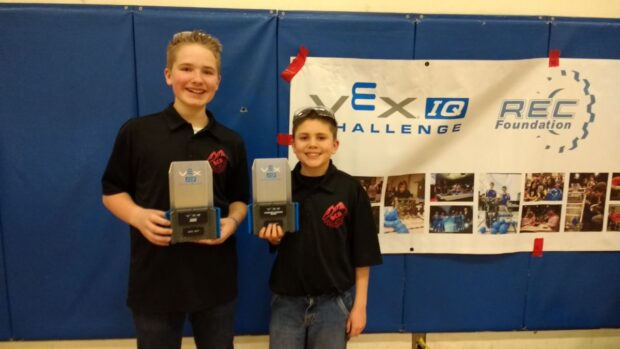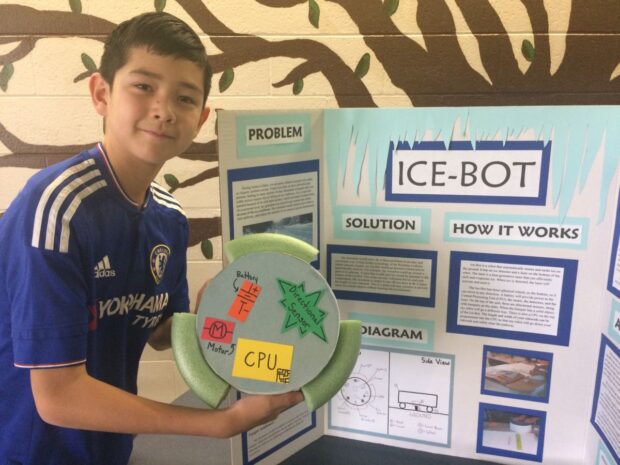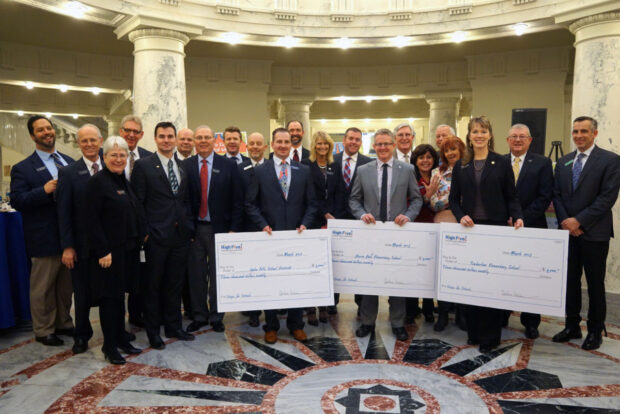Hailey kids headed to robotics world championship
A group of Wood River Middle School seventh graders won the VEX IQ Robotic State Championship in Caldwell on Saturday. The team now qualifies to compete in the VEX IQ Robotics World Championship in Kentucky on April 19-25.

“These kids have worked extremely hard and put in many hours before and after school to get where they are,” said Jeremy Silvis, a teacher and robotics coach at Wood River’s Middle School. “Their hard work paid off.”
Wood River Middle School’s team will be 1 of 275 Middle School teams that has qualified to attend the world championship.
From fire to ice: Boise sixth-grader wins top honors at Invent Idaho Competition
Kai Hatten, a White Pine Elementary School sixth grader, who won first place at the 2016 Invent Idaho Competition for his fire extinguisher built for outdoor fire pits invention, took home top honors for his latest creation — Ice-Bot, a robotic system to melt and evaporate ice from outdoor pathways.
Kai was one of the top 10 students from Idaho to win a $1,000 grant that will help pay for his travels to the National Invention Convention in Washington, D.C., in June, where nearly 240 students will participate.
Kai got his idea this winter when all of the sidewalks and front porches were iced over for weeks. He discovered a heat-generative laser that could melt and evaporate ice. Watch his presentation here.
“All of the stores were sold out of ice melt, so he started researching other ways to melt ice,” said Kai’s mom Katy Hatten.
Lawmakers walk to win $10,000 for local schools
The challenge is over for 40 lawmakers, who walked nearly 12 million steps during February and tracked their physical activity for the Steps for Schools program.
On Wednesday, Rep. Priscilla Giddings, R-White Bird, was named the winner of the challenge after she walked 847,106 steps and earned $3,000 to give to Timberline Elementary in Weippe.
Rep. Mat Erpelding, D-Boise, placed second and won $3,000 for Pierce Park Elementary in Boise and Rep. Bryan Zollinger, R-Idaho Falls, came in third place and won $3,000 for the Idaho Falls School District.
In addition to the top three winners, 19 legislatures who achieved an average of 10,000 steps per day received a $350 check to donate to a school in their district.
The Steps for Schools program was hosted by the High Five Children’s Health Collaborative powered by the Blue Cross of Idaho Foundation. Participating legislators made a commitment to get active, eat healthier and learn about the current status of childhood health in Idaho.
Apply for a STEM grant
If you’re an Idaho educator and want training to boost the performance and engagement of students in STEM, you’re eligible to apply for a grant. The Idaho STEM Action Center awarded grants of $75,000 each to four programs that support educators to bring high-quality interdisciplinary science, technology, engineering, and math to students.
This initiative focuses on trainings that reach across disciplines, which STEM Action Center executive director Angela Hemingway said reflects how professionals practice STEM in their careers.
“It allows students to deepen their understanding of the interdisciplinary nature of STEM by utilizing skills across multiple subject areas,” she said.
The four programs are:
- Achieving Student Success through Excellence in Teaching will build informal and formal K-12 educators’ understanding of the essential features of inquiry, misconceptions about inquiry, and the instructional focus on process skills that support implementation of Idaho science standards. ASSET will also help instructors learn how to better integrate English-language arts, history, and social studies into their science classes, making science more meaningful to students. The deadline to apply is April 7, 2017.
- C-STEM aims to transform computing, science, technology, engineering, and mathematics education in both formal and informal education settings. C-STEM will work with formal middle and high school educators to integrate computer programming and robotics into STEM subjects through hands-on, personalized, and collaborative learning strategies. The deadline to apply is April 7, 2017.
- Educurious will provide formal public educators who impact students in grades 3-12 with strategies to effectively integrate 21st-century skills into science teaching by content integration — both across scientific disciplines and subject areas. The program will guide teachers to encourage students to work collaboratively, persist in their endeavors, communicate well, and integrate subject knowledge into creating solutions for authentic problems via a series STEM problem- and project-based design workshops — all skills required in STEM fields. The deadline to apply is April 7, 2017.
- Making Sense of Science offers a comprehensive approach to educator training that focuses on science understanding through the integration of math, classroom practice, literacy, and pedagogical reasoning. Strengthening educator knowledge and skills fosters improvements in student science and math achievement and better prepares pupils for college and the 21st-century workforce. The approach is very effective for English-language learners and students struggling with literacy skills. The grant is open to informal and formal science educators who impact teachers of students in grades 5-9, and the deadline to apply is April 3, 2017.
Educators can apply for the grants here.


